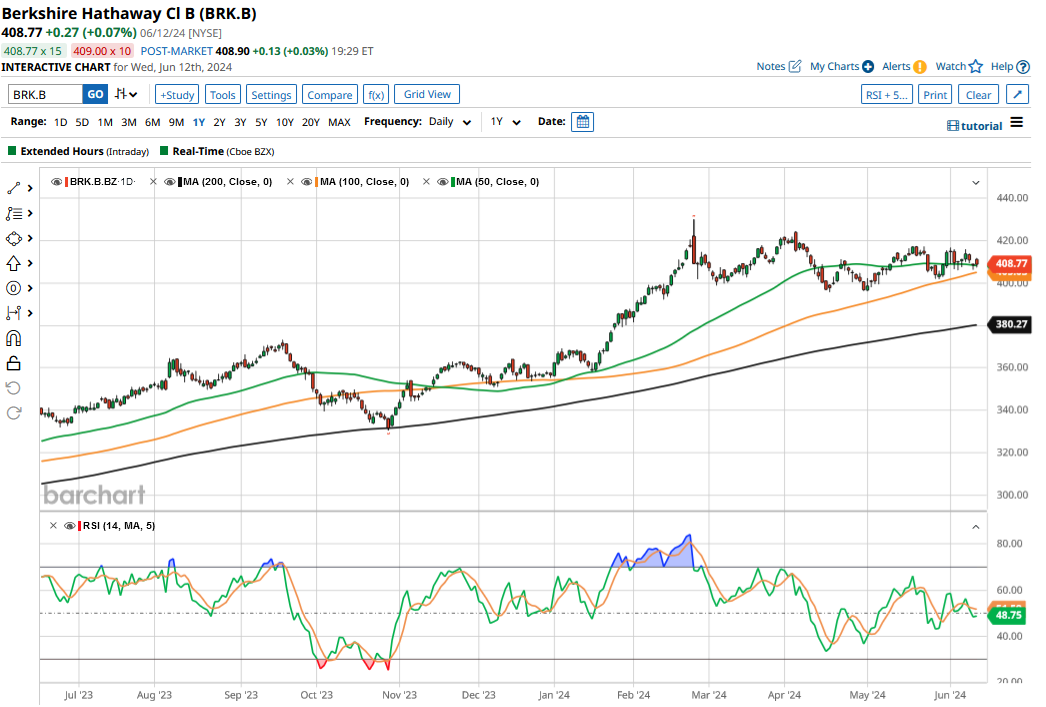Berkshire Hathaway (BRK.B) chair Warren Buffett is renowned as one of the most adept investors in history, amassing his wealth through shrewd investment decisions. The venerable “Oracle of Omaha” has openly acknowledged various errors – both of omission and commission – throughout his illustrious investing career spanning nearly six decades.
Surveying the current investment landscape, artificial intelligence (AI) emerges as an enticing prospect. What are Buffett’s insights on AI, and could he be overlooking the sector’s unprecedented growth?

Warren Buffett’s Analogies Surrounding AI
During Berkshire Hathaway’s recent annual shareholder meeting, Buffett drew parallels between AI and nuclear weapons, cautioning that the technology could fuel unprecedented opportunities for exploitation. He likened AI to a genie, underscoring the looming regret society might harbor upon releasing this metaphorical entity.
Historically, Buffett has maintained a stance against engaging with “emerging” or “sunshine” industries, instead favoring traditional sectors like banking and insurance. The nonagenarian refrained from investing in internet stocks during the 1990s and has recently sidestepped arenas such as electric vehicles, cryptocurrencies, Web3, and AI.
The Circuit of Buffett’s Investment Decisions
Buffett’s inclination to eschew companies within these sectors primarily arises from his strategy to invest within his “circle of competence.” Additionally, his pessimistic views on cryptocurrencies, including his characterization of Bitcoin as “rat poison squared,” have reinforced his conviction. The soaring valuations of companies such as Tesla have also deterred Buffett due to misgivings as a value investor.
Retrospectively, Buffett’s avoidance of internet and EV stocks now appears judicious given the downfall of many dot-com era companies like Intel, with few exceptions like Amazon.
Debunking AI as the New Tech Bubble
Although some claim that the surge in AI stocks, notably Nvidia, resembles the dot-com era bubble exemplified by Cisco, stark distinctions emerge. Unlike the past, where companies were gauged on obscure metrics like website visits, Nvidia’s rise stems from substantial earnings growth.
Nvidia’s success in selling AI chips has yielded significant revenue and operating income expansions, suggesting a sustainable growth trend for companies leveraging its technology. While the term “AI” permeates corporate earnings calls, genuine signs of an impending bubble remain elusive.
Buffett’s Vantage Point on the AI Phenomenon
Traditional AI investments have primarily revolved around Nvidia, Super Micro Computer, Microsoft, and Alphabet, excluding Berkshire Hathaway’s direct stakes in such firms but possessing indirect exposure through S&P 500 ETFs.
Yet, with the proliferation of AI-equipped gadgets, a new frontier in the AI realm is imminent. Notably, Berkshire previously held a significant stake in HP, witnessing a resurgence driven by AI-enabled PC sales, which Buffett overlooked.

Despite his reduction in Apple holdings, the tech giant remains Berkshire’s most substantial investment. Apple’s recent forays into AI technology have garnered newfound admiration in the market.
Apple’s Evolution in the AI Space
Following a period of underperformance and market cap volatility, Apple’s focus on AI innovations has catalyzed a resurgence in market sentiment. The company’s strategic emphasis on “Apple Intelligence” has propelled its market stature and augmented its technological offerings.
While Buffett may not categorize Apple as a quintessential AI entity, Apple’s integration of AI functionalities within its products positions it as both a consumer and tech powerhouse within the evolving technological landscape.
In essence, while Buffett may have bypassed the initial phases of the AI surge, Berkshire inadvertently benefits from the burgeoning industry through its substantial Apple holdings, predestined to partake in the forthcoming phases of the AI rally.

